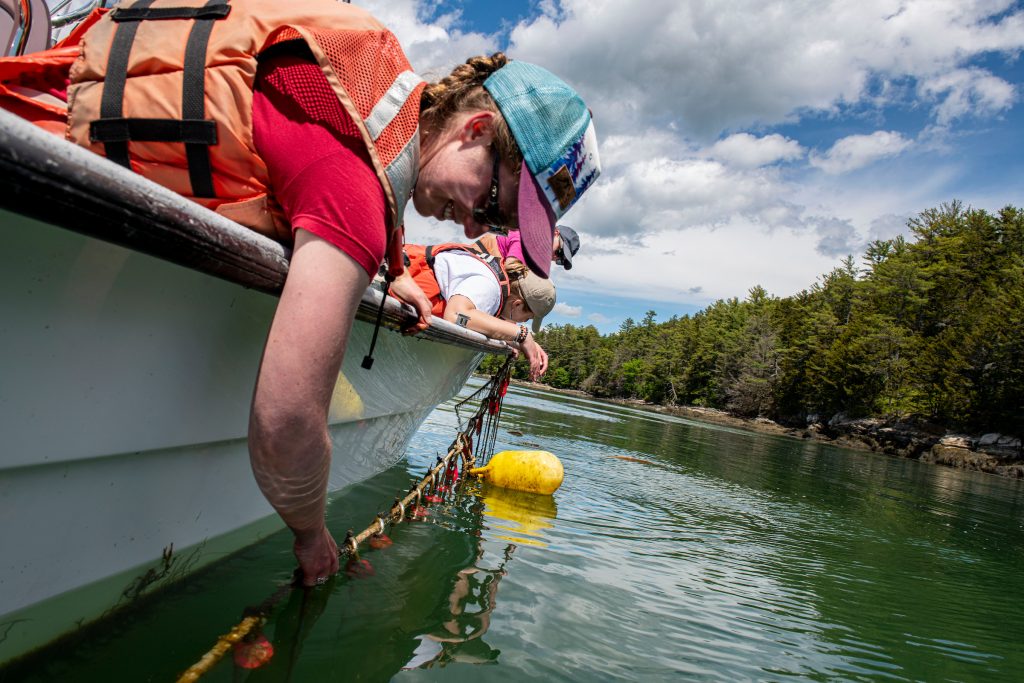Graduate Programs
The School of Marine Sciences offers M.S. and Ph.D. programs in Oceanography and Marine Biology; an M.S. program in Marine Policy, a dual (M.S.) degree that comprises one degree in Policy and one in Aquaculture, Marine Biology, or Oceanography; and a non-thesis Professional Science Master (PSM) in Marine Sciences. Students interested in a Marine Policy Ph.D. should contact marine policy faculty to discuss interdisciplinary degree options in affiliated programs (Ecology and Environmental Sciences and Interdisciplinary PhD). Graduate students are encouraged to take advantage of interdisciplinary opportunities that our program offers while gaining fundamental knowledge and individualized training to achieve successful careers.

Graduate students benefit from the diverse and unique habitats that the Gulf of Maine has to offer for research in Marine Sciences. In addition to these excellent regional research opportunities, the world-wide research activities of SMS faculty provide excellent opportunities for research throughout the global ocean.
SMS offers a wide variety of courses and extensive research opportunities to match graduate students’ interests. You can browse SMS’s faculty biographies and individual faculty web pages to learn more about graduate student opportunities. Before applying, prospective graduate students are strongly encouraged to contact faculty directly to identify common research interests. Identifying prospective faculty advisor(s) is an essential step towards entering our program. Graduate program learning outcomes can be found here.
SMS Graduate Programs
Affiliated Graduate Programs
Application Process and Criteria
The SMS application process has two essential steps. The first essential step is identifying prospective advisor(s) and a source of financial support for your tuition, stipend, and research costs. More information on these costs can be found at the Graduate School’s webpage on funding for prospective students. Many graduate students are supported by their advisor’s externally funded research grants. We also strongly encourage applications to apply for national fellowships and scholarships to obtain their own funding.
It is expected that you will take an active part in the step by contacting potential advisors whose interests most closely match with your own, and by receiving their encouragement to apply. Students interested in the non-thesis Professional Science Masters (PSM) degree option should contact Dr. William Ellis (Associate Director) at william.ellis@maine.edu. Not all faculty are able to accept new students every year. White our faculty try their best to reply to all inquiries, if you have not received a response after 1-2 reminders it is likely that they are not currently recruiting new students. Submitting an application without first corresponding with your prospective faculty advisor is likely to substantially delay the review of your application.
The second essential step is to submit an application to UMaine’s Graduate School. After you have discussed your application with a prospective advisor and are encouraged to apply, you can go to the Graduate School’s Application Page. The SMS Graduate Admissions Committee evaluates the applications based on academic background, previous experience, and fit with faculty research programs.
There are three sets of materials evaluated in the graduate application: course work, a personal essay, and letters of recommendation. The Graduate Record Exam (GRE) is not required for admittance to SMS graduate programs.
Course work
Suitable course work towards a Bachelor’s or Master’s degree is required, with a minimum overall GPA above 3.0 for a Bachelor’s degree in most cases. While GPA is an important part of assessing performance in past courses, subject matter of those courses and trends over an academic career are also important considerations. Additional course work beyond the formal degree may also be beneficial. These topics should be discussed with your prospective advisor.
Personal essay
A personal essay describing your academic interests, professional experience, and potential research plans in graduate school is required. In the essay, you should explain the types of research questions and training opportunities that you would like to pursue as a graduate student and how these relate to your past experiences and the research interests of prospective faculty advisor(s) in SMS.
Letters of recommendation
Three letters of recommendation are required from instructors or supervisors who are familiar with your previous academic or professional performance.
Application deadline
SMS has a rolling deadline for graduate applications. Complete applications are reviewed on a rolling basis throughout the year. Most of our applications are received by January 15, following the standard deadline used by many graduate programs at UMaine. Submitting an application without first corresponding with your prospective faculty advisor (Step 1, above) is likely to substantially delay the review of your application.
Should you apply for a M.S. or Ph.D.?
Sometimes it is unclear whether to apply for a Masters or Ph.D. degree, especially if you are interested in proceeding through a Ph.D. program. For many students, an M.S. is their intended terminal degree, and we encourage such students to apply to SMS. For students intending to get a Ph.D., it is sometimes a good idea to get a Masters first, and even to get a Masters at a different institution than the Ph.D. Sometimes students start in one degree and shift to the other during their program, and these shifts go in both directions. If the question about applying for a M.S. or Ph.D. applies to you, you should consult with your prospective advisor(s) to help determine which program makes the most sense for you.
After following the above guidance, if you have questions regarding current applications, please contact the current chair of the SMS Graduate Admissions Committee Michelle Staudinger at (michelle.staudinger@maine.edu).
